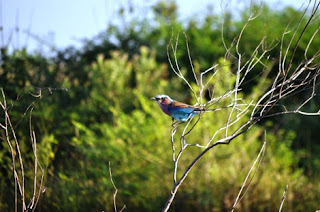Yesterday evening, I headed out to the sand river, my favorite drive in the vicinity of Kiba Point. Last year, the sand river was exactly what it's name implied, a vast, sparkling dry river bed of white sand that hinted at a wetter era long past. But in truth, that era was only as long ago as the last rainy season, and as we enter July, encroaching tendrils of water still snake up the sand river. Following the heavy rains in April and May, the riverbed has gone to seed, with a blanket of grasses and shrubs washing across the once blinding sand.
Now, even driving over the long-used tracks feels like trail-blazing, and the giraffes that frequent the sand river every evening seem exaggerated as they tower above low shrubbery. And while this particular drive didn't reveal the sand river's classic image-its pride of 15 lions grouped around a buffalo carcass-it certainly did not dissapoint with a wealth of birdlife and some large herds of very large mammals.
This breeding herd of buffalo initally fled when they heard the approching vehicle, the accompanying flock of cattle egrets forced to abandon their perches and take to the air with chaotic flare.
Eventually, though, the herd turned and trained their characteristic stony glare on me.
Here a white-browed coucal takes flight over the scrub.
On my way back, I encountered a vain lilac-breasted roller possing on a bush.
To complete the drive, as I neared the Rufiji at the beginning of the sand river, I caught a giraffe set against an acacia bush and Kipalala hill, the sun setting just over his shoulder.
Some people might wonder how I can do the same drive week after week, and year after year. It's simple. Every time is different, every animal sighting is rewarding, and never more so than on the expanse of the sand river.





